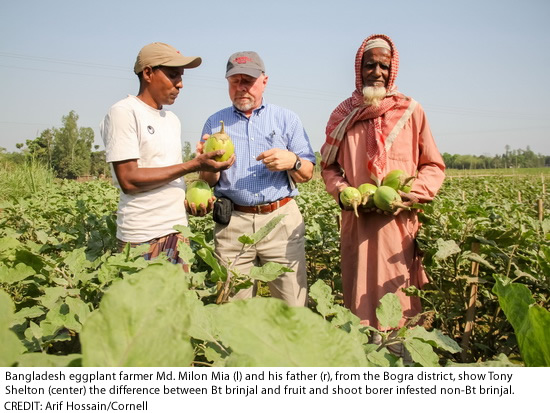
USAID Supports Cornell's Feed the Future South Asia Eggplant Improvement Partnership
March 30, 2016| |
The United States Agency for International Development (USAID) has awarded Cornell University a US$4.8 million, three-year grant to strengthen capacity to develop and disseminate Bt eggplant in Bangladesh and the Philippines. The award supports USAID's work under the Feed the Future, the US government's global initiative to fight hunger and improve food security using agricultural science and technology.
Dr. Anthony Shelton, and international professor of entomology in the College of Agriculture and Life Sciences at Cornell will direct the project. According to Dr. Shelton, because of infestation by the fruit and shoot borer, or FSB, as much as 70 percent of the eggplant crop in South Asia never makes it to market. Bt brinjal (eggplant) has been developed over the last 11 years and uses a gene from a naturally occurring soil bacterium to produce a protein that causes borers to stop feeding.
"Bangladesh faces food shortages, increasing population, and decreasing amounts of arable land," said Dr. Md. Rafiqul Islam Mondal, director general of BARI. "Genetically engineered crops developed under the Feed the Future South Asia Eggplant Improvement Partnership will enhance the quality of life for Bangladeshis by increasing income, improving nutrition and health, and fostering a safer environment."
The Feed the Future South Asia Eggplant Improvement Partnership addresses and integrates all elements of the commercialization process — including technology development, regulation, marketing, seed distribution, and product stewardship. It also provides strong platforms for policy development, capacity building, gender equality, outreach and communication.

For more on the story, visit the Feed the Future website.
| |
Biotech Updates is a weekly newsletter of ISAAA, a not-for-profit organization. It is distributed for free to over 22,000 subscribers worldwide to inform them about the key developments in biosciences, especially in biotechnology. Your support will help us in our mission to feed the world with knowledge. You can help by donating as little as $10.
-
See more articles:
-
News from Around the World
- New Approaches Needed to Meet Sustainable Development Challenges
- Nigeria's Science and Technology Minister Urges Use of Agricultural Biotechnology for Economic Development
- Researcher Improves Crop Performance through Biotechnology
- Gene that Blocks Lettuce Germination Also Regulates Flowering Time
- Four InnateTM Potato Events Granted Nonregulated Status in Canada
- USDA Deregulates Two Lines of GE Corn
- USAID Supports Cornell's Feed the Future South Asia Eggplant Improvement Partnership
- A Black (White) Hole in the Global Spread of GM Cotton
-
Research Highlights
- Isolation of Anthocyanin Pathway Regulator from Horny Goat Weed
- Advanced Flowering of Juvenile Citrus Induced by a Viral Vector
- The Role of Annexin Genes in Strawberry Fruit Development
-
Beyond Crop Biotech
- Discovery Shows Parallels Between Plant and Human Immune Systems
- Synthetic Cell Dies Without Mysterious Genes
- Study Reveals that Water Bears Do Not have Extensive Foreign DNA
-
Announcements
- 5th International Conference and Exhibition on Metabolomics
-
Read the latest: - Biotech Updates (February 18, 2026)
- Gene Editing Supplement (January 28, 2026)
- Gene Drive Supplement (February 22, 2023)
-
Subscribe to BU: - Share
- Tweet
